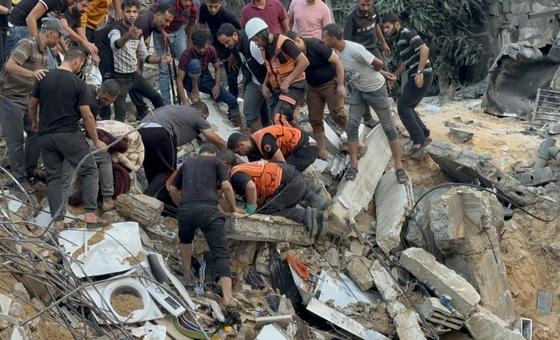More than 1.5 million Gazans are displaced, 18 hospitals have shut down, and hundreds of thousands are living in fear and under continuing Israeli bombardment.
“Casualties continue to mount, with the dead reportedly exceeding 11,000 people – the majority of them children and women,” said Emergency Relief Coordinator and Humanitarian Affairs chief, Martin Griffiths.
“The actual total, however, is likely much higher as figures have not been updated for five days due to a collapse of communication networks in Gaza,” he added.
Mr. Griffiths, who is also the UN Emergency Relief Coordinator, further stated that across Gaza, but particularly in the north, food and water supplies are running perilously low, and the lack of fuel means communications and essential services like water desalination are progressively failing.
Free the hostages
Across the border, civilians in Israel endure deep pain of their own as they mourn the brutal, inhumane killing of 1,200 people, he added, stressing that the nearly 240 hostages – from babies to octogenarians – must be released immediately and without condition.
Mr. Griffiths reiterated the UN’s 10-point plan setting out the necessary requirements for an effective humanitarian response.
He called on UN Member States to help achieve these objectives.
Basic needs
“We are not asking for the moon. We are asking for the basic measures required to meet the essential needs of the civilian population and stem the course of this crisis,” he stressed.
In conclusion, Mr. Griffiths warned that for as dire as the situation is in Gaza, “it could get far worse.”
“If we do not take action now, this is a conflict that could spread its tendrils further into other parts of the Occupied Palestinian Territory and beyond, and drag the region into a conflagration with even more catastrophic consequences,” he said.
Crisis creating ‘deeper fractures’: UN rights chief

Volker Türk, UN High Commissioner for Human Rights. (file)
Volker Türk, UN High Commissioner for Human Rights (OHCHR), voiced deep concern over the growing risk of spillover into the wider Middle East region, if the fighting continues.
He also emphasized that the crisis posed another global shock to the multilateral system “driving more polarization and creating deeper fractures, with terrible impact on the solutions that humanity so urgently needs.”
He recalled the resolution adopted by the General Assembly at its emergency special session on the crisis, which called for an immediate and sustained humanitarian truce leading to a cessation of hostilities, and the resolution adopted by the Security Council on Wednesday that called for urgent and extended humanitarian pauses and corridors throughout the Gaza Strip.
Mr. Türk underscored that these resolutions must not be ignored by Israel or Palestinian militants in the Gaza Strip.
“There must be a ceasefire on humanitarian and human rights grounds, and an end to the fighting – not only to deliver urgently needed food and provide meaningful humanitarian assistance, but also to create space for a path out of this horror,” he stressed.
The UN rights chief also warned against rising hate speech and disinformation, which is fuelling dehumanization and thwarting the search for an enduring political solution.
“I am very concerned about the risk of further grave violations, even potentially amounting to atrocity crimes, in light of recent statements by some in leadership positions,” he said.

